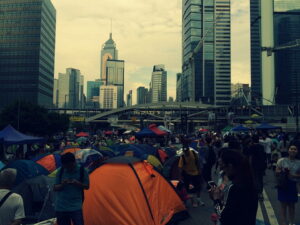by The Cowl Editor on September 26, 2019
News

by Nicole Silverio ’22
News Staff
On Saturday, Sept. 15, several protestors were injured in yet another violent protest in Hong Kong between the police force and the citizens. The protests have caused major political upheaval in the past six months.
Thousands marched from Causeway Bay to government offices in Admiralty, striving to peacefully protest the government until they respond to their pro-democracy demands.
Protestors demand that the government withdraw the Extradition Bill, commission an inquiry into police brutality, put a stop to classifying the protestors as “rioters,” provide amnesty for arrested protestors, and the privilege to directly elect leaders in both the Legislative Council and Chief Executive which has been denied by Hong Kong leaders and the Chinese government.
Although they are supposed to be peaceful protests, they have not remained that way. In the most recent protest, radical protestors began throwing bricks and petrol bombs at police, causing the police to retaliate with tear gas, water cannons, and jets of blue dye with the intent to mark the protesters so police could eventually arrest them.
Throughout the night, protesters set fires and vandalized subways, leading to several arrests. According to CNN reporters, one incident left a man in the Tim Hau neighborhood “dazed and bleeding on the floor.”
According to the South China Morning Post, one viral video showed a mob of young men beating a man to the point of unconsciousness.
These riots and protests began in Hong Kong in March 2019 to oppose the Extradition Bill. This bill would allow Hong Kong to extradite a person to mainland China or other countires, including Taiwan. This means that someone accused of committing a crime in another nation would have to be handed over to where the crime was committed.
Being an independent state from the Chinese government, many citizens of Hong Kong believe this is a violation of their independence and civil rights which threatens their democracy.
Protestor Mandy, 26, spoke about the riots, saying, “We need to keep coming out to tell the government to respond to our five demands, otherwise it will think we accept the withdrawal of the Extradition Bill.”
Another protestor named Jackie, who attended with her mother said, “Our government hasn’t replied to any of our demands…we are in a corner and we can’t do anything apart from coming out to the street every single weekend.”
Police increased security checks and reduced the use of public transportation. Public transportation areas have been a frequent destination for pro-democracy demonstrators, which has increased police activity in these areas.
One witness named Lai, 31, saw at least twenty police officers at the train station when he returned from the protests. Some of them stormed into the carriage, and, according to him, “Everyone started to scream ‘they are coming, they’re crazy.’ They kept moving and hitting everyone in the car. I started running. I saw police using their batons to keep hitting the same person on the head, even though he was kneeling down in the corner.”
Police commented on this situation, stating that they came to the station after protestors damaged a customer service center and ticket machines and assaulted people.
According to CNN, Junius Ho, a pro-government lawmaker, calls on citizens of Hong Kong who are loyal to the government to “get together and clean Hong Kong.” He even went as far as praising pro-government citizens for attacking protestors in Yuen Long.
Although Hong Kong is a part of the People’s Republic, meaning it belongs to China, they have their own currency, political and legal system which results in them considering themselves “one country, two systems,”guaranteeing that citizens of Hong Kong can have certain freedoms that citizens in mainland China do not have.
The government in Beijing is eager to end the rioting, but protestors are not willing to back down.
Protestor Simon Chang said, “If we don’t stand up now, it’s going to be too late.” Another protestor who remained anonymous said, “Even if they arrest more people, that won’t stop us. They keep arresting people, making us more angry. If the movement stretches to 100 days, 200 days or even 1,000 days and we still don’t get what we want, we will continue to come out.”
Protests are expected to continue through Oct. 1, which will mark the 70th anniversary of the People’s Republic.